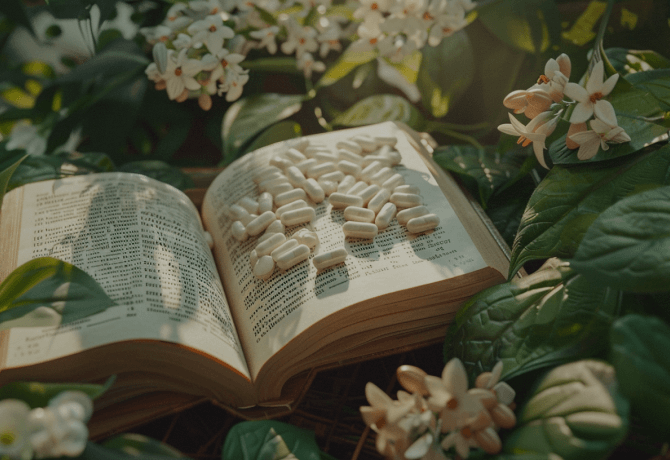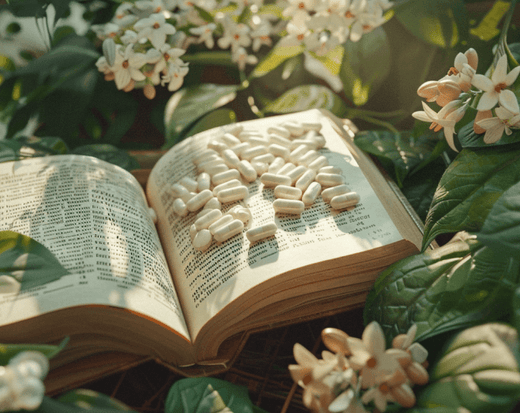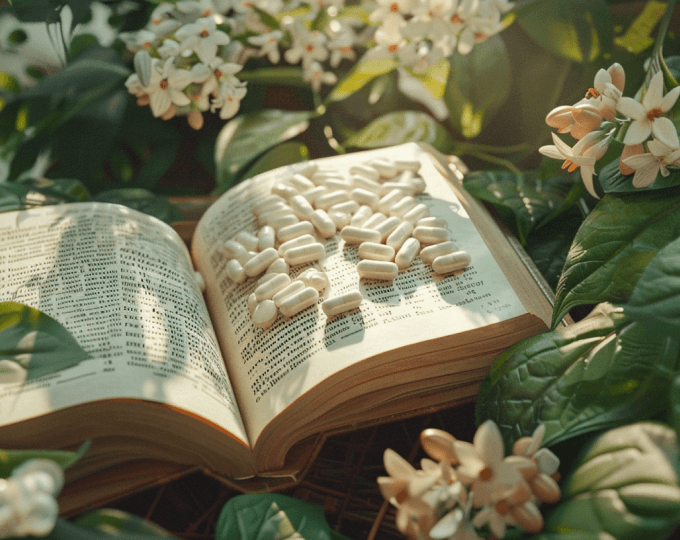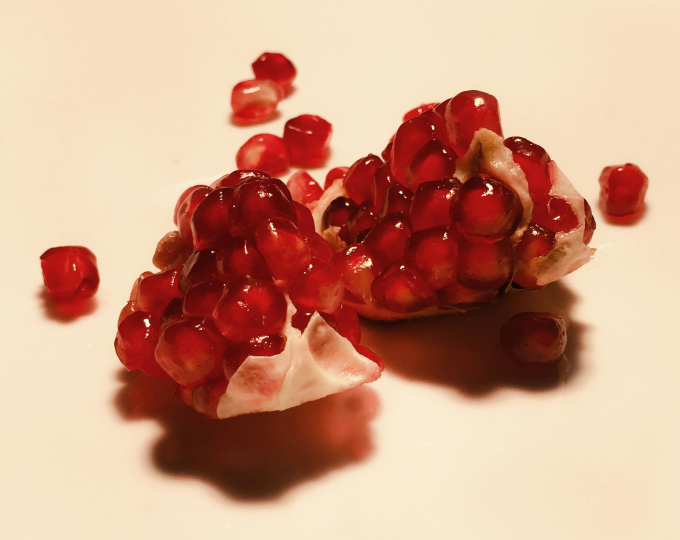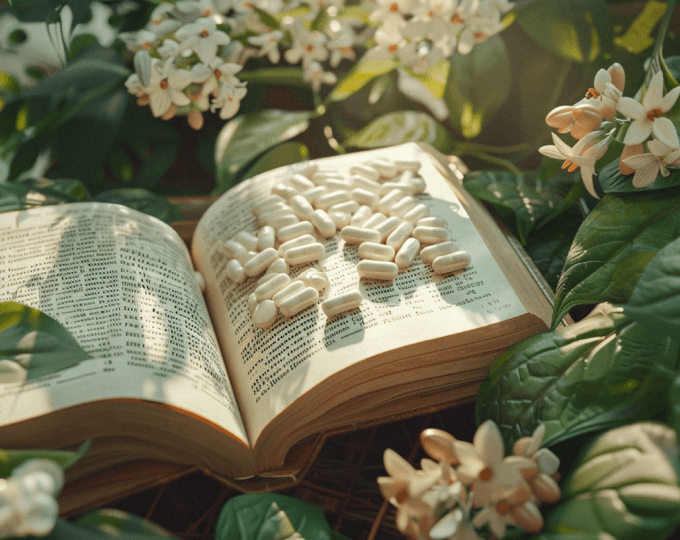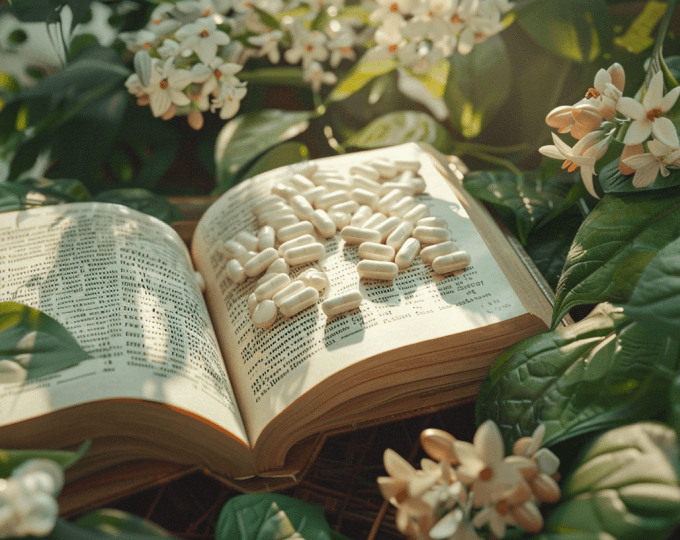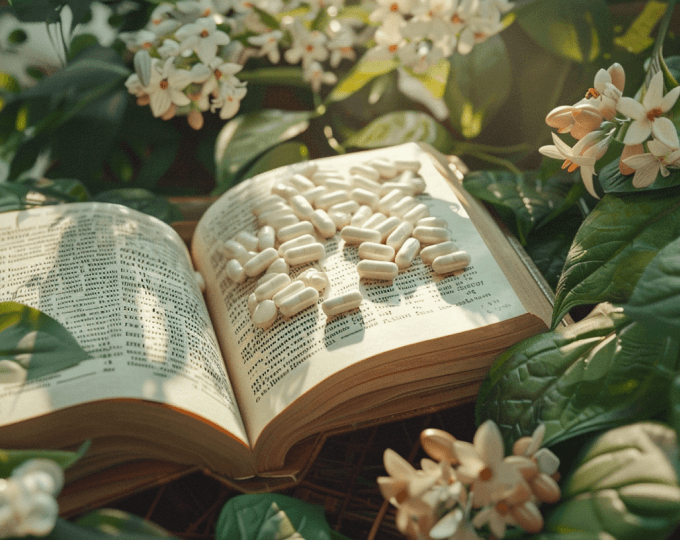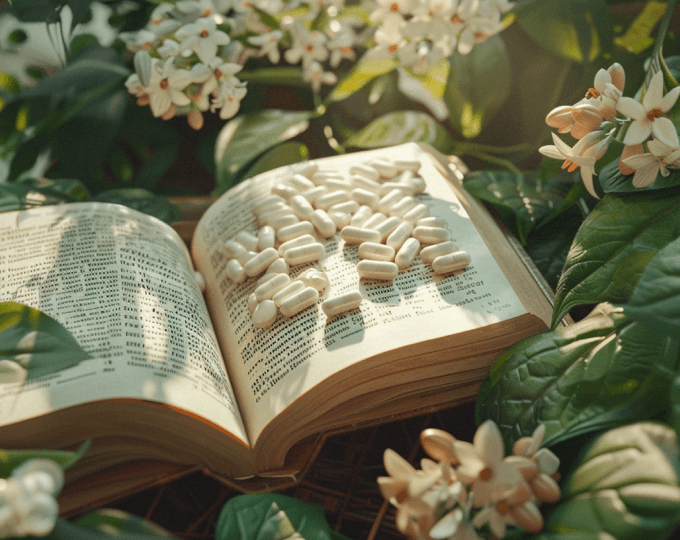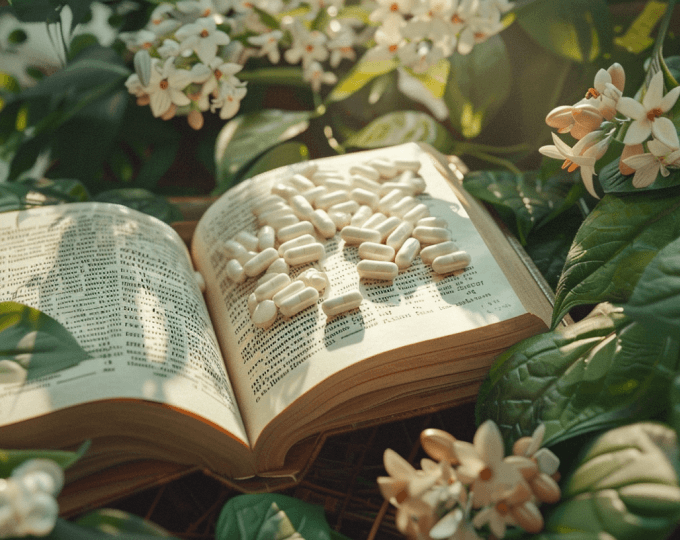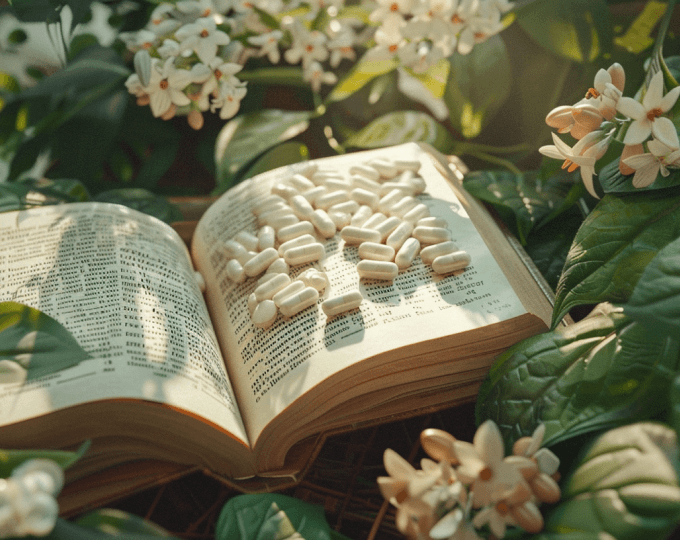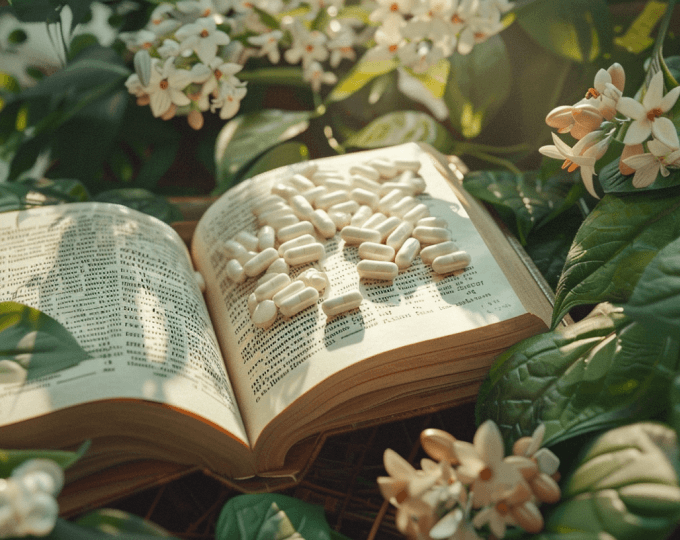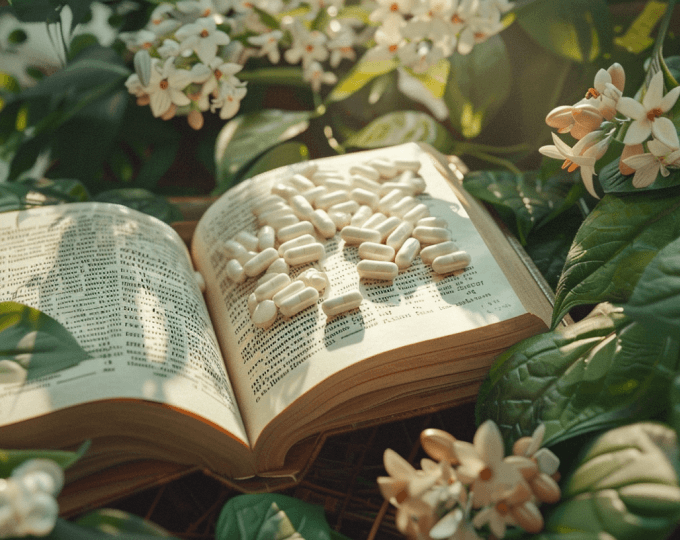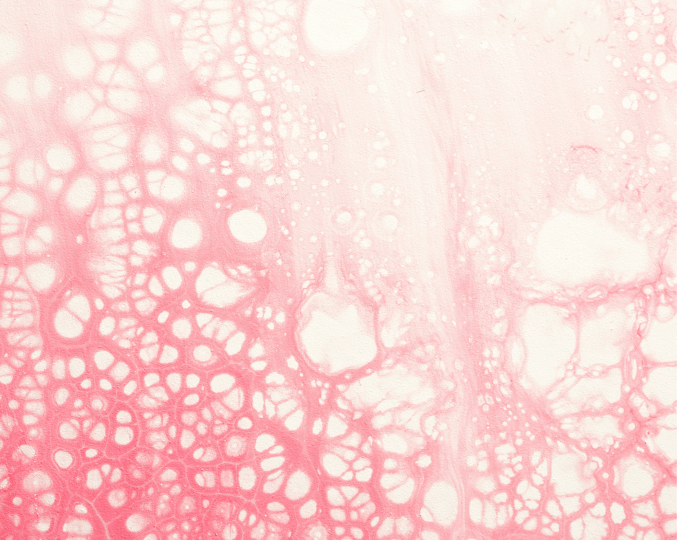Themen dieses Blogartikels:
Definition: What is EGCG?
EGCG is the abbreviation for epigallocatechin gallate. It is a secondary plant substance belonging to the large group of flavonoids. Chemically, EGCG is a carboxylic acid ester of epigallocatechin and gallic acid.¹
EGCG is therefore one of the so-called catechins. These are important building blocks of natural tannins, which are found particularly in green tea. The substance is therefore also known as tea catechin.² The substance often appears on food products and dietary supplements under the name green tea extract.³
What functions does EGCG have?
This chemical compound is believed to have health-promoting effects. Catechins such as EGCG are considered powerful antioxidants, whose therapeutic potential is currently being researched.⁴ For example, the substance in green tea has been discussed in connection with cancer, Alzheimer's disease, high blood sugar, and inflammation, among other things.⁵
However, the data currently available is still quite sparse and partly contradictory. Many study results come from animal experiments or cell cultures and cannot be easily extrapolated to humans. Furthermore, the trials sometimes use green tea and sometimes pure EGCG, making the results difficult to compare.⁶ Nevertheless, there are initial promising indications – for example, that green tea can have a beneficial effect on the development of tumors of the gastrointestinal tract and possibly reduce recurrences of intestinal polyps.⁷ Furthermore, test-tube experiments have shown that EGCG can prevent the fatal plaque formation in Parkinson's and Alzheimer's diseases.⁸
Advertisement
Specially developed for women's health & the hormonal system
With the premium natural ingredients Ashwagandha, Green Tea Extract (EGCG), Astaxanthin & Dong Quai (Chinese Angelica)
Supplemented with vitamin B6 & pantothenic acid for hormone regulation
-
No fillers or flavors
Developed with doctors & experts
Delicious taste
Easy-to-dose liquid product

What makes EGCG unique?
Green tea has been consumed in Asia for thousands of years and is highly valued for both its tangy flavor and its potential health benefits. The flavonoid EGCG it contains is believed to possess numerous beneficial properties.
This natural substance can apparently slow down the inflammatory processes in the central nervous system that are typical of the chronic inflammatory neurological autoimmune disease multiple sclerosis.⁹ Green tea can also help with weight loss, as the catechins, in combination with the caffeine it contains, boost metabolism and thus fat burning.¹⁰
When do you especially need EGCG?
EGCG is said to have antioxidant, anti-inflammatory effects. This means that this substance is thought to reduce the production of reactive oxygen species (ROS).¹¹ These harmful forms of oxygen are linked to the aging process and various diseases.¹² EGCG appears to have a particularly supportive effect on the cardiovascular system.¹³
What should you pay attention to when taking EGCG?
Despite its suspected anti-carcinogenic effects, EGCG is not a miracle cure for cancer. On the contrary, patients undergoing chemotherapy should be cautious when taking epigallocatechin gallate, as this chemical compound can counteract the effectiveness of certain medications.¹⁴
In addition, excessive consumption of dietary supplements, such as capsules or powder containing concentrated green tea extract, can lead to severe liver damage and even liver failure. High blood pressure and increased intraocular pressure are also possible. Dosage should be carefully observed, as the maximum daily dose of 800 mg of epigallocatechin-3-gallate should not be exceeded. If a product contains highly purified epigallocatechin gallate, the maximum amount is 150 mg per serving or a maximum of 300 mg per day. It is not recommended for children or pregnant or breastfeeding women.¹⁵
Which foods contain particularly high levels of EGCG?
Large amounts of epigallocatechin gallate are found primarily in unfermented teas such as green tea, white tea, and oolong tea.¹⁶ The EGCG content is significantly lower in black tea. Green tea is therefore a particularly good source of this substance, as it contains much more EGCG than other teas, such as black tea. Green tea extract, a concentrated form of the compound found in green tea, also often provides particularly high amounts of EGCG. It is frequently used in dietary supplements to provide the benefits of green tea in a convenient, doseable form.
Traces of EGCG are also found in pecans, hazelnuts, and the skin of various apple varieties. ¹⁷
Conclusion
EGCG (epigallocatechin gallate) is a valuable secondary plant compound found particularly in green tea, especially from the Camellia sinensis plant. EGCG is valued in many green tea products because it enhances the effects of green tea and has numerous beneficial properties. Potential positive effects on the cardiovascular system, skin health, and inflammatory processes are also being discussed.¹⁸
Green tea extract, in capsule or powder form, provides a concentrated supply of EGCG without relying on daily tea preparation. However, careful dosage should be observed to avoid overdose and potential side effects such as liver damage. Especially in dietary supplements, green tea catechins can promote the absorption of vitamin C, which may act as an antioxidant.
The effects of EGCG continue to be researched, and initial studies suggest that this plant compound may be associated with positive effects in the prevention of diseases such as Alzheimer's and diabetes, as well as nutritional support through metabolic stimulation.¹⁹ Green tea and green tea extract therefore offer a promising addition to a balanced diet and lifestyle.
The benefits of green tea and its active ingredients can be found not only in foods such as tea and extract, but also in high-quality dietary supplements that specifically target the properties of EGCG and other plant compounds. However, pregnant and breastfeeding women, as well as children, should avoid taking high-dose green tea extract.
This encyclopedia entry is based on carefully researched sources:
Bibliography & Sources
- vitalstoff-lexikon.de/Sekundaere-Pflanzenstoffe/Epigallocatechingallat/Definition-Synthesis-Resorption-Transport-und-Distribution
- chemie.de/lexikon/Epigallocatechingallat.html
- klartext-futterrgaenzung.de/wissen/lebensmittel/futterrgaenzmittel/gar-nicht-so-harmlos-gruenteeextract-80386
- flexikon.doccheck.com/de/Epigallocatechingallat
- spiegel.de/gesundheit/ernaehrung/gruener-tee-wie-der-wirkstoff-ecgc-die-gesundheit-foerdert-a-869518.html
- ernaehrungsmedizin.blog/2018/08/20/gruener-tee-extract-liver-versa-blood-pressure-rises/
- onkologie-partner.de/krebsmedizinen/alternative-und-komplementaere-medizin-bei-boesbaren-krankenen/47-gruener-tee-egcg
- mdc-berlin.de/de/news/archive/2008/20080530-substanz_ecgc_in_gr_nem_tee_verhindert_t_d
- gesundheitsforschung-bmbf.de/de/gruner-tee-gegen-multiple-sklerose-3073.php
- aok.de/pk/magazin/ernaehrung/abkommen/tee-zum-abkommen-was-ist-dran/
- flexikon.doccheck.com/de/Catechin
- chemie.de/lexikon/Reaktive_Sauerstoffspecies.html
- vitalstoff-lexikon.de/Sekundaere-Pflanzenstoffe/Epigallocatechingallat/Deficiency symptoms
- onkologie-partner.de/krebsmedizinen/alternative-und-komplementaere-medizin-bei-boesbaren-krankenen/47-gruener-tee-egcg
- klartext-futterrgaenzung.de/wissen/lebensmittel/futterrgaenzmittel/gar-nicht-so-harmlos-gruenteeextract-80386
- fitbook.de/ernaehrung/oolong-tee-application-effect-and-correct-preparation
- vitalstoff-lexikon.de/Sekundaere-Pflanzenstoffe/Epigallocatechingallat/Lebensmittel
- vitalstoff-lexikon.de/Sekundaere-Pflanzenstoffe/Epigallocatechingallat/Deficiency symptoms
- spiegel.de/gesundheit/ernaehrung/gruener-tee-wie-der-wirkstoff-ecgc-die-gesundheit-foerdert-a-869518.html
